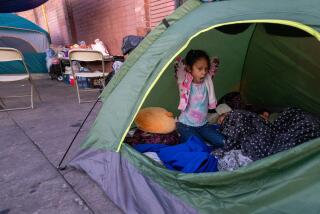Hope, Help Greet Kosovar Refugees in L.A.
It was after midnight on a clouded night when Besnik Vlashi was asked to survey the situation.
All you could see out the windows were the freeway stripes and white lights. The bumping bus carried Besnik and his mother, sisters, uncles, aunts and cousins north on the San Diego Freeway, cutting through the Westside en route to the San Fernando Valley.
No one seemed to be paying any attention to where they were or where they were going. Two rows up, Besnik’s mother closed her eyes against a splitting headache. Behind, an uncle wrapped an arm around his boy and hummed. They passed Beverly Hills, Santa Monica, the Getty--famous places with famous names--without notice. Across the aisle, the pretty girl with the ponytail stared straight ahead. Except for the American cousin, there was little talk of any kind.
They were tired. No one had slept in a bed for a day and a half. The eyes still open were rimmed in red.
Yet Besnik’s appraisal was quick and sure.
“I am glad to be here because everything here is beautiful,” he said, the certainty of an 18-year-old asserting itself against a world that has become a blur of confusion.
Besnik is an ethnic Albanian from a small border town in southern Kosovo. He and 27 relatives landed at Los Angeles International Airport late Thursday night, among the first of what are anticipated to be about 20,000 Kosovo Albanian refugees coming to the United States, about 60 of those to Southern California.
The Vlashis arrived here with little but one another, the clothes on their backs and, in the case of one 12-year-old, a toy duck. For months, they have been on the move and losing things in the process--their homes, their fathers and brothers, their belongings.
Upon arrival, it seemed to Besnik, this might be the moment when they could stop losing. If the sudden generosity of their hosts is an indication--they came armed with teddy bears and sweaters and gift certificates and chocolate chip cookies--they might even start regaining some lost ground.
The Vlashis say they were pushed from their hometown by Serb police and military troops at the outbreak of the NATO air war against Yugoslavia. Like hundreds of thousands of other ethnic Albanians, they ended up across the Yugoslav border in Macedonia in the tented border camps or, if fortunate, in the homes of relatives.
The Vlashis had cousins there and were doubly lucky--they had, in Hajrush Vlashi, a relative the United States.
When NATO announced that it would begin temporarily resettling refugees in countries outside the region of the war, Hajrush, a waiter, and his wife, Renee, a college student, got busy. Renee contacted the Jewish Federation Valley Alliance, near their West Hills home. The federation very quickly threw its considerable energy into the problem and found homes to take all the Vlashi relatives, should they be able to get here. On Thursday night most of them did.
Hajrush beamed as he greeted his parents. It had been so long--nine years--he didn’t even recognize his younger sisters and brother. After a teary TV-bright-light reunion at the airport, everybody was parceled out to host families in Simi Valley, Calabasas, West Hills, Westlake Village and Studio City.
Besnik, a high school junior, ended up with his mother and three sisters in the well-tended split-level Calabasas home of Bobbie and Steven Black and their four children. They got to bed after 2 a.m.
When the Blacks awoke Friday before 7, the Vlashis were already up and dressed and had stowed the pull-out beds. They put all of their possessions in a hall closet: three small carry-on bags, a few shirts and three thin jackets.
“This is all they had,” Bobbie Black said. “It breaks your heart.”
Repairs to hearts and spirits were given a hand when the Vlashis talked by telephone to Besnik’s father, who has remained behind in Macedonia. He wavers, Besnik says, between coming here and going home to join the Kosovo Liberation Army.
Besnik talked animatedly with his father, then, to save his hosts’ money, abruptly hung up.
“No! Don’t hang up! Let them all talk,” Black said. “You’re not going to let your mom and all the kids talk?”
She redialed the number. When connections were reestablished, Besnik’s mother, Fatime, talked to her husband. She smiled, blushed and fought off tears.
“That’s the first time I have seen her smile since she’s been here,” Black said.
There are plans for apartments, job counseling, Knott’s Berry Farm and Dodger baseball. Besnik has already found the Blacks’ guitar and played it. There’s talk of movies, music and watching Lucy on TV.
Refugees by definition live in unclear conditions; getting somewhere means leaving somewhere else. The arrival of the Vlashis was even more enigmatic than most. No one knows how long the Kosovars will be here, if they will leave, or for where. There are the missing men and others left behind.
Whatever comes, Besnik says, it can’t be any worse than what they’ve already seen. For the Vlashis, Friday was the best day they had had in a very long time.
More to Read
Sign up for Essential California
The most important California stories and recommendations in your inbox every morning.
You may occasionally receive promotional content from the Los Angeles Times.









